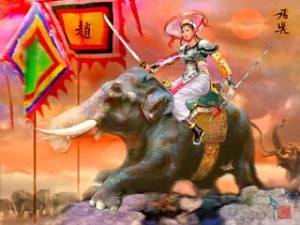Lady Trieu was a Vietnamese revolutionary who lived from 225—248 CE. In the vein of the Trung sisters, Lady Trieu was strongly opposed to Chinese rule. After the deaths of the Trung Sisters, the Chinese retook control of Vietnam and governed it for over 200 years. During this time, the Wu Dynasty, the Chinese government had become very harsh and cruel to the Vietnamese people. Lady Trieu was born in the Nong Cong district of Vietnam, and was an orphan from a very young age. She lived with her elder brother and his wife, the latter of which she hated for her cruelty. The story goes that she killed her sister-in-law in retaliation for extreme cruelty and allegiance to the Chinese, and fled to the mountains. Here, she gathered 1,000 supporters for her rebellion. Before the age of 21, Lady Trieu had led more than 30 successful raids and battles against the Chinese. She and her troop fought in yellow uniforms and on war-elephants. They furthered the rebellion, which her elder brother joined later. The rebellion is mentioned in Chinese historical accounts, but does not allude that it was led by a woman, as Confucian outlook made defeat at the hands of a female general humiliating and degrading to the Chinese.
In 248, due mostly to her lack of troops, Lady Trieu suffered a huge defeat. Ashamed and upset over the loss, Lady Trieu fled to the mountains and committed suicide. This is likely analogous to the naval belief that a captain should “go down with the ship”.
Legacy: Like the Trung Sisters, Lady Trieu went down in history as a symbol of freedom and revolution. Many Vietnamese revolutionaries would claim that they saw Lady Trieu in their dreams, where she offered them advice and blessings on their coming rebellions. Temples and statues of Lady Trieu have been built in her honor across Vietnam, and major cities usually have at least one street dedicated to and named after Lady Trieu.
Her brother reportedly tried to dissuade her from rebelling against the Chinese, and her response may be a product of oral legend.
I will not resign myself to the lot of women who bow their heads and become concubines. I wish to ride the tempest, tame the waves, kill the sharks. I have no desire to take abuse.
Note:
It is important to note that the quote is not exactly meaningful nor is it helpful as it blames the abuse women received and receive systematically on themselves, when that is not the case. It is important to remember that victims are not the catalysts of their own abuse, nor are they deserving of it if they receive it. I considered deleting the quote altogether because I do not agree with it, nor do I like it anymore, but I thought it may be better used in order to highlight our society’s strong tendency to turn the blame on the victims rather than the perpetrators. Please try to be wary when you start to do the same. Thank you.
Sources:
http://asianhistory.about.com/od/vietnam/p/Lady-Trieu-Vietnam.htm

